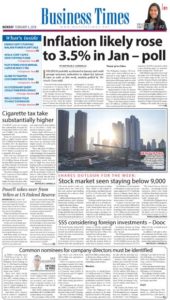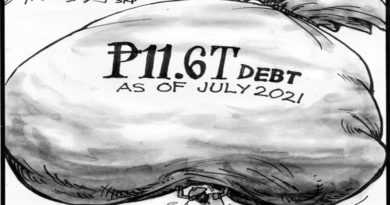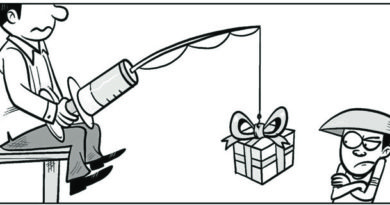MANILA: ECONOMY – ‘Inflation likely rose to 3.5% in Jan – poll’

Inflation probably accelerated in January and could prompt monetary authorities to adjust key interest rates as early as this week, analysts polled by The Manila Times said.
Forecasts for the month ranged from 3.4 percent to 3.9 percent with a 3.5 percent average, higher than the 3.3 percent recorded in December.
The Bangko Sentral ng Pilipinas (BSP) also expects an increase to 3.5-4.0 percent, citing the implementation of a new tax law, while the Department of Finance has said that the rise in consumer prices could have stayed unchanged at 3.3 percent.
Official January data will be released tomorrow by the Philippine Statistics Authority.
All nine analysts polled said the year-ago rate of 2.7 percent would have been surpassed as upward price pressures from higher taxes would have boosted the consistently higher consumer price growth seen since the start of 2017.
‘Sharp’ price hikes
“The Philippines headline CPI (consumer price index) inflation rate is expected to surge higher in January, due to the impact of sharp rises in retail petrol prices following a spike in world oil prices at the end of 2017 and higher excise taxes on fuel,” IHS Markit APAC chief economist Rajiv Biswas said.
Implementation of the Tax Reform for Acceleration and Inclusion (Train) law would have also pushed up indirect taxes on other products, he noted, leading to 3.9-percent inflation in January.
“[D]ue to the sharp upturn in headline CPI inflation, combined with robust economic growth and rapid credit expansion, the BSP is expected to adopt a more hawkish stance on monetary policy during 2018,” Biswas said.
With inflation expected to rise toward the upper end of the Bangko Sentral’s 2.0-4.0 target range for the year, he said the Monetary Board could tighten monetary policy by 25 basis points in the first quarter, most likely during this Thursday’s meeting, with a second rate hike coming in the second quarter.
ANZ Research economist Eugenia Victorino also forecast higher inflation of 3.7 percent for the month, pointing to tax reforms having led to higher transport costs and prices of sugar-sweetened beverages.
“Adding to the upside risk is the rise in global Brent prices and the weakness in the Philippine peso,” she said.
Victorino discounted the possibility of a rate hike later this week but said the policy statement could adopt a more hawkish tone.
“[W]e still expect the central bank to wait until the inflation numbers in February are locked in before raising its interest rates in March,” the ANZ economist said.
Acceleration expected
HSBC analysts, meanwhile, believe inflation rose to 3.6 percent last month, due partly to higher excise taxes on fuel that affected both transport and housing utility costs.
Higher electricity prices are also expected due to additional taxes on coal—the fuel used by most of the country’s power plants.
“We also expect headline CPI to gradually lift up over the next few months, potentially reaching close to 4 percent in second quarter or third quarter,” the banking giant said.
Estimates of 3.5 percent, meanwhile, were offered by both Security Bank Corp. and Land Bank of the Philippines analysts.
Angelo Taningco, economist and assistant vice-president for Security Bank’s Treasury Group, said this would reflect higher prices of select food and beverage items as well as petroleum products.
Rising global oil prices, a weaker peso and new excise taxes were largely responsible for the price hikes, he said.
“Nevertheless, I expect the BSP to maintain its monetary policy settings, i.e., keeping the key interest rates and reserve requirement ratios unchanged, to be decided in the Monetary Board’s first meeting on 8 February,” Taningco said.
LandBank market economist Guian Angelo Dumalagan also cited higher prices of goods and services, the depreciation of the peso and a recovery in global oil prices.
Food and fuel prices potentially increased at a faster pace due to the imposition of higher excise taxes under the Train law while fuel prices also received added boost from the stronger annual rise in oil prices in the global market, he noted.
The depreciation of the peso, meanwhile, made imported goods more costly in local currency terms, Dumalagan added.
The overall inflation uptick, however, was likely tempered by a softer increase in the cost of rice, he stressed.
“The BSP would most likely keep its policy settings unchanged during its next meeting, despite the inflation risk brought about by the Trian law, as the increase in prices is currently projected to remain within the BSP’s target range of 2-4 percent,” the LandBank economist said.
He said that toward the end of the year, the Bangko Sentral might hike policy rates in response to higher interest rates abroad as these could result in unwanted financial volatility if not addressed.
Second round impact awaited
The lowest inflation estimates of 3.4 percent came from ING Bank Manila, DBS, Metropolitan Bank and Trust Co.’s (Metrobank) research unit, and the Ateneo de Manila University.
ING Bank Manila senior economist Joey Cuyegkeng acknowledged the impact of higher excise taxes but said this would remain moderate as the Train law had just been implemented.
“With such a high January inflation forecast,” however, Cuyegkeng said “the market may become worried that inflation will accelerate faster than expected in the coming months.”
“Second round effects are still to be determined in March to June” and could cause inflation to breach the central bank’s target range, he added.
“An inflation report this coming Tuesday that is in line with BSP’s forecast could raise inflation expectations which may spur BSP to tighten as early as the March meeting. Our base case is for a rate hike at the May meeting,” he said.
DBS economist Gundy Cahyadi said the Bangko Sentral could finally move to hike interest rates this week or in March.
As far as inflation is concerned, he said DBS was also of the view that inflationary pressures were on an upward trend, partly due to higher taxes.
“But the main reason why we think that policy normalization is imminent is the fact that the domestic economy is robust and it can withstand a gradual adjustment in interest rates,” Cahyadi said.
Metrobank Research head Marc Bautista also cited a general increase in prices across commodities and food items for his 3.4-percent estimate.
“At any rate, we believe that inflation expectations are indeed going up and may result in the BSP hiking policy rates, perhaps by midyear,” he said.
Ateneo economist Alvin Ang, meanwhile, cited base effects and higher but still benign price increases.
With the latter expected to pick up in succeeding months, “we think BSP will start adjusting the rates toward the second quarter,” Ang said.
COURTESY:
BUSINESS TIMES
.
NOTE : All photographs, news, editorials, opinions, information, data, others have been taken from the Internet ..aseanews.net | [email protected] |
For comments, Email to :
Pahulu Gan – Contributor | [email protected]









